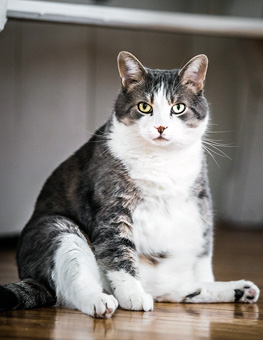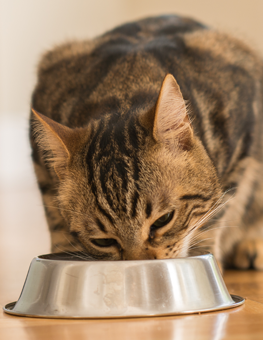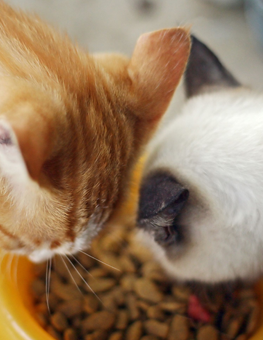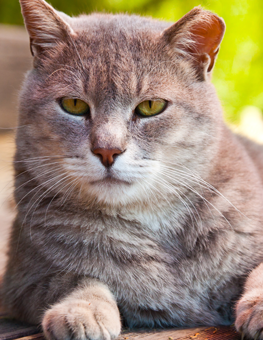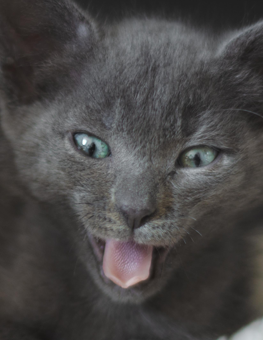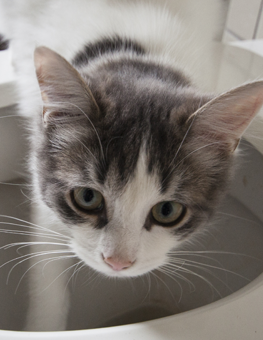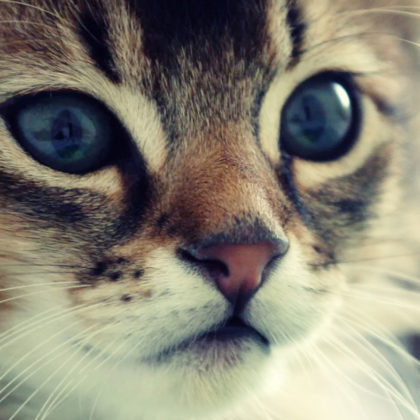Healthy Eating for Your Cat
As a cat owner, it's your responsibility to make sure that your feline is receiving optimal nutrition. But what does that even mean?

The best source of information on how best to feed your cats is your veterinarian or pet nutritionist.
Nutrition for Cats
There is no food pyramid for our cats like there is for people. Or is there? How does one become educated in best practices when it comes to nutrition for cats?
If your feline has become a bit chubby or doesn't seem to have the same spunk that he used to have, you may need to examine what he's eating on a regular basis. There is a ton of different and sometimes conflicting information out there on how best to feed your pets and provide proper nutrition for cats. Be sure to keep in mind that every cat is different. What one cat prefers, or what is the best diet for one cat, may not be what is most suitable for another cat.
The best source of accurate information on how best to feed your cats is your veterinarian or pet nutritionist. However, be sure to keep the following general tips in mind in order to improve your furry friend's quality of life and increase his longevity.
Read Food Labels
The next time you're at the pet store and examining the ingredients in your feline's food, keep in mind that cats are obligate carnivores. That means that their bodies are designed to eat primarily meat. Corn, grain, and carb-filled foods are very common as you walk through the pet food aisles or shop on the internet. Look into products that are made with mostly natural ingredients, are free of preservatives and fillers, and have meat as the first ingredient listed on the bag or can. Some experts believe going for an even split between a nutritious dry food and a tasty wet food can help your cat receive well-rounded nutrition.
Limit Cat Treats
The occasional treat is just fine for your furry friend, but there is such a thing as too much of a good thing! If possible, search for a pet treat that will add to your cat’s overall nutrition, rather than feeding him the equivalent of junk food. Delectables treats are packed with protein, and many varieties contain vitamins important for healthy cat nutrition. For those kitties who need a little extra help with weight loss, or for those who have medical conditions, your veterinarian may stock prescription treats that are safe and healthy for your cat.
Multiple Cat Households
If you have multiple cats, but only one requires a specialized diet, it can be challenging to ensure that each cat is eating what they are supposed to be. Cats are solitary hunters, and actually prefer to eat alone. Placing food in separate areas of the house or utilizing vertical space to move one or more cats up off the ground can be helpful.
In some cases, it may be better just to separate the cats behind closed doors during mealtimes. You can also use separate microchip feeders that only open up for one specific cat. These strategies can prevent your chunky or special needs kitty from dipping into extra food and they can help you be diligent about his diet.
Encourage Water Intake

When considering nutrition for cats, adequate water intake is their most basic need.
Something that people often forget about when considering nutrition for cats is their most basic need: adequate water intake. It can be challenging to encourage some cats to drink enough water. Many cats will develop urinary issues at some point in their lives, contributed to by a lack of water intake. An easy way to get your cat to drink more water is to mix some extra water into his wet food. Cats also prefer to drink running water, rather than still water. Replacing his water bowl with a water fountain is a surefire way to encourage him to drink more. Finally, research has shown that cats who eat more often, drink more often. Splitting up your kitty’s meals into multiple, small portions four times a day, rather than only two, can encourage him to make an extra pit stop or two at his water fountain.
Proper nutrition is one of the most important aspects of cat wellness. Putting a little bit of thought into your cat’s diet and consulting with your veterinarian will ensure that your cat lives a long, happy, healthy life.



